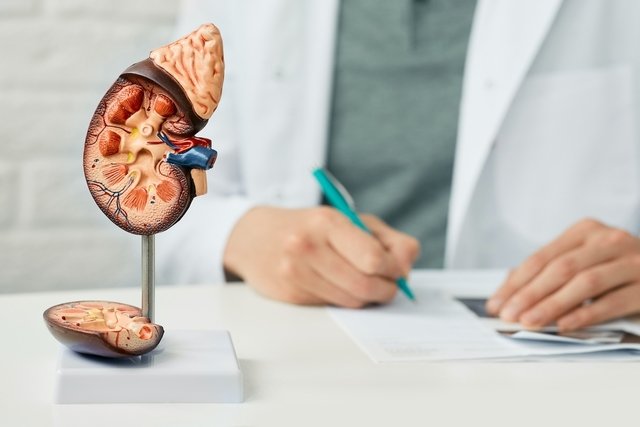Kidney stones are a type of stone that appears in the kidneys and urinary tract, formed by substances such as calcium and uric acid, which can accumulate when present in excess in the urine, causing symptoms such as pain and nausea.
Although small stones can be eliminated from the body naturally through urine, sometimes medications with anti-inflammatories and opioid analgesics are indicated to control the pain they cause. Although there are medications that help eliminate stones, surgery may be indicated to remove larger stones. Understand better the treatment for kidney stones.
In case of suspected kidney stones, it is important to consult a urologist, nephrologist or general practitioner for an assessment and initiation of appropriate treatment, through which it is also possible to prevent the formation of new kidney stones.

Kidney stone symptoms
The main symptoms caused by kidney stones are:
- Pain in the back, side of the abdomen or groin;
- Reddish urine;
- Nausea;
- Vomiting;
- Pain when urinating.
Symptoms often occur suddenly and the pain usually increases and decreases in intensity, often causing the person to be unable to find a position of relief.
In addition, other symptoms such as fever and chills may also occur and indicate the existence of a urinary infection associated with the stone. Learn about other symptoms of kidney stones and how to identify them.
How to confirm the diagnosis
The diagnosis is usually made by a urologist, nephrologist or general practitioner, who may indicate imaging tests such as ultrasound of the kidneys and urinary tract, computed tomography or magnetic resonance imaging. Although an x-ray of the abdomen or pelvis can sometimes show the presence of a stone, depending on its type, it may be difficult to visualize on this exam.
If you want to confirm your risk of kidney stones, make an appointment with the specialist closest to you:
Taking care of your health has never been easier!
In addition to these, urine examination and blood tests such as urea and creatinine measurement may also be indicated to assess kidney function. Beta-HCG dosage may also be indicated for women of childbearing age to rule out the possibility of pregnancy, as the pain may be similar to that which occurs in some cases of ectopic pregnancy.
Possible causes
Kidney stones are caused by changes in the acidity and composition of urine, causing substances such as calcium, oxalate or cystine, when present in excess, to form crystals and accumulate in the kidneys and urinary tract.
Generally, the risk of kidney stones is higher in people with a previous or family history of stones, low water intake, high blood pressure, diabetes, obesity, gout and other diseases such as Crohn’s disease or renal tubular acidosis.
Furthermore, the composition of urine is influenced by diet, so that greater or lesser intake of some nutrients, such as calcium and magnesium, can increase the risk of kidney stone formation.
Types of kidney stones
The main types of kidney stones are:
- Calcium calculations: are the most common types of kidney stones;
- Uric acid stones: They are generally related to the greater acidity of urine, which favors the formation of crystals of this substance;
- Struvite calculations: they can be caused by urinary infections caused by some microorganisms that cause a decrease in urine acidity;
- Cystine calculations: It is a rare type of stone and may be related to the abnormal elimination of this substance in the urine, which can occur in some diseases such as cystinuria.
Although identification of the type of stone is not always carried out, it can be recommended, because stone analysis can provide information about its composition and indicate more appropriate dietary changes to prevent new stones and more appropriate treatments. Learn more about the types of kidney stones and how to avoid them.
Kidney stone treatment
Kidney stone treatment may include:
1. Medicines for kidney stones
Anti-inflammatories, such as diclofenac or ketorolac, and analgesics, such as paracetamol or tramadol, may be indicated to control pain caused by kidney stones. However, these medications do not help eliminate stones in the urine.
Although small stones can come out naturally, other medications such as calcium channel blockers or alpha-adrenergic blockers may be indicated to help eliminate them.
2. Surgery for kidney stones
Surgery is generally indicated in cases where the stones are large and cannot be eliminated with the use of medication or when there are complications such as obstruction of the urinary tract. In these cases, surgeries such as percutaneous nephrolithotomy or rigid or flexible ureteroscopy may be indicated. Better understand the stone treatment options with surgery.
3. Shockwaves
In some cases, extracorporeal shock wave lithotripsy may also be indicated. Although it is not surgery, it is also an option in these cases, where the objective is to break the stones using high-energy waves, allowing them to be eliminated through the urine.
Natural treatment options
Natural treatments should not replace the treatment proposed by the doctor, however, one option is stonebreaker tea, which has a diuretic action and facilitates the elimination of stones. Discover other natural treatment options for kidney stones.
How to avoid kidney stones
Calculations can be avoided with:
1. Diet
Dietary changes are generally recommended for people with or have a history of kidney stones and involve reducing the intake of salt, foods that contain a lot of sodium and meat; maintain an adequate intake of calcium, through dairy products, for example; and drink enough water. See the most recommended foods and which ones should be avoided for those with stones.
2. Diuretics and other medications
Some medications such as thiazide diuretics, potassium citrate or allopurinol may be indicated to prevent the recurrence of stones, especially in people who have had stones more than once, and their indication generally varies according to the type of stone formed and the results of the urine analysis. Understand better what diuretics are for.
When to go to the hospital
It is important to seek an emergency if:
- Significant decrease in the amount of urine;
- Pain or vomiting that does not go away despite the use of medication;
- Fever or chills.
It is also recommended that people who have only one kidney or who have received kidney transplants seek an emergency room due to the risk of a more serious outcome.

Sign up for our newsletter and stay up to date with exclusive news
that can transform your routine!
Warning: Undefined array key "title" in /home/storelat/public_html/wp-content/plugins/link-whisper-premium/templates/frontend/related-posts.php on line 12
Warning: Undefined array key "title_tag" in /home/storelat/public_html/wp-content/plugins/link-whisper-premium/templates/frontend/related-posts.php on line 13



